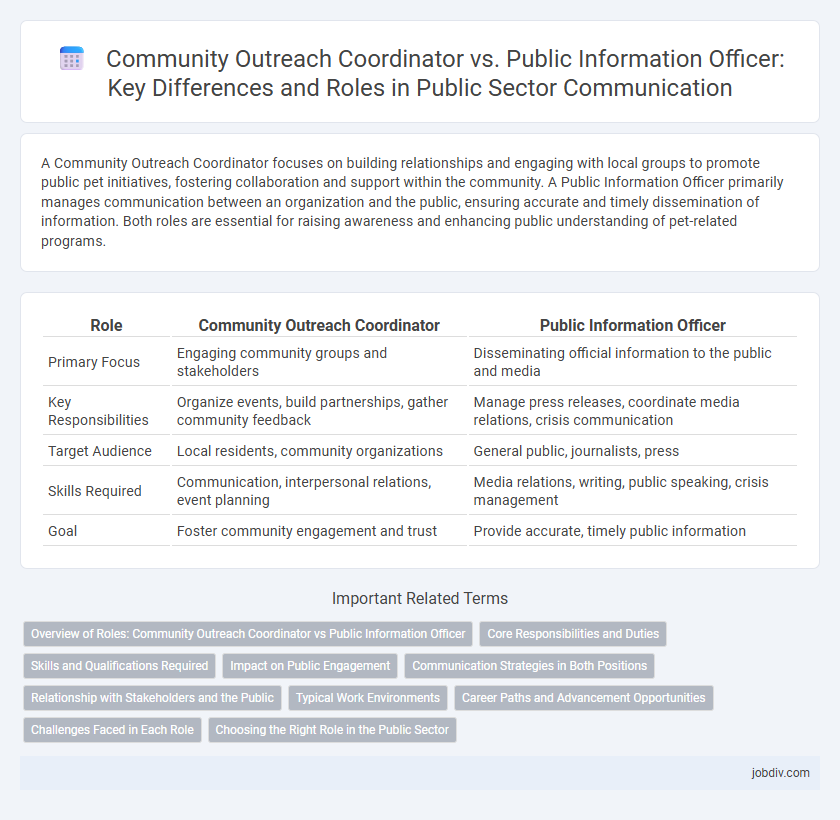A Community Outreach Coordinator focuses on building relationships and engaging with local groups to promote public pet initiatives, fostering collaboration and support within the community. A Public Information Officer primarily manages communication between an organization and the public, ensuring accurate and timely dissemination of information. Both roles are essential for raising awareness and enhancing public understanding of pet-related programs.
Table of Comparison
| Role | Community Outreach Coordinator | Public Information Officer |
|---|---|---|
| Primary Focus | Engaging community groups and stakeholders | Disseminating official information to the public and media |
| Key Responsibilities | Organize events, build partnerships, gather community feedback | Manage press releases, coordinate media relations, crisis communication |
| Target Audience | Local residents, community organizations | General public, journalists, press |
| Skills Required | Communication, interpersonal relations, event planning | Media relations, writing, public speaking, crisis management |
| Goal | Foster community engagement and trust | Provide accurate, timely public information |
Overview of Roles: Community Outreach Coordinator vs Public Information Officer
Community Outreach Coordinators focus on building relationships and engaging with community members to promote programs and services, often working directly with local organizations and stakeholders. Public Information Officers manage the dissemination of information to the public and media, crafting press releases, handling communications strategies, and ensuring accurate representation of organizational messages. Both roles require strong communication skills but differ in their primary audience engagement and information management responsibilities.
Core Responsibilities and Duties
Community Outreach Coordinators focus on building relationships with local organizations, organizing events, and facilitating communication between the community and the organization to promote engagement and support. Public Information Officers manage the dissemination of accurate information to the public and media, develop press releases, and handle crisis communication to maintain the organization's public image. Both roles emphasize strategic communication but differ in target audiences and methods, with coordinators fostering direct community involvement and officers managing media relations.
Skills and Qualifications Required
Community Outreach Coordinators require strong interpersonal skills, cultural competence, and experience in event planning and community engagement to effectively connect organizations with local populations. Public Information Officers must possess excellent communication skills, media relations expertise, and the ability to manage public messaging under pressure, often holding degrees in communications, journalism, or public relations. Both roles demand proficiency in strategic communication, public speaking, and familiarity with digital platforms for outreach and information dissemination.
Impact on Public Engagement
Community Outreach Coordinators directly foster public engagement by organizing local events and building relationships with community members, increasing participation and trust. Public Information Officers manage communication channels and disseminate timely information, shaping public perception and ensuring accurate message delivery. Both roles significantly enhance public interaction, with coordinators driving grassroots involvement and officers maintaining informed and connected audiences.
Communication Strategies in Both Positions
Community Outreach Coordinators design and implement targeted communication strategies to engage diverse local populations through events, workshops, and direct interactions, emphasizing relationship-building and grassroots involvement. Public Information Officers develop and manage strategic media relations, press releases, and public statements to disseminate accurate information broadly, focusing on message consistency and crisis communication. Both roles utilize digital platforms and data-driven techniques to maximize outreach efficacy and ensure clear, accessible public messaging tailored to their respective audiences.
Relationship with Stakeholders and the Public
Community Outreach Coordinators prioritize building and maintaining direct, personal relationships with local stakeholders through grassroots engagement and tailored community programs. Public Information Officers focus on managing the flow of information between an organization and the public, ensuring clear, consistent messaging and handling media relations. While both roles foster public trust, Community Outreach Coordinators emphasize interactive dialogue and local presence, whereas Public Information Officers concentrate on strategic communication and information dissemination.
Typical Work Environments
Community Outreach Coordinators typically work in nonprofit organizations, educational institutions, and local government agencies, often engaging directly with community members in various public settings. Public Information Officers are more commonly employed by government departments, law enforcement agencies, and large corporations, where they manage media relations and public communication from office environments. Both roles may require travel to events or emergencies, but Public Information Officers frequently operate within structured media centers or press rooms.
Career Paths and Advancement Opportunities
Community Outreach Coordinators typically advance by deepening engagement skills and moving into senior outreach or program management roles within nonprofit or government sectors. Public Information Officers often pursue career growth through expanding media relations expertise, leading to positions such as communications director or public affairs manager in governmental or corporate settings. Both career paths emphasize strategic communication but diverge in focus areas--community engagement versus media and public messaging.
Challenges Faced in Each Role
Community Outreach Coordinators often face challenges in building trust within diverse populations and managing limited resources to execute effective programs. Public Information Officers must address the difficulty of quickly disseminating accurate information during crises while countering misinformation and maintaining public confidence. Both roles require strategic communication skills but differ in audience engagement and urgency of message delivery.
Choosing the Right Role in the Public Sector
Community Outreach Coordinators prioritize building relationships and engaging directly with local populations to foster trust and support for public programs. Public Information Officers specialize in managing media communications and disseminating accurate information to ensure transparency and maintain a positive public image. Selecting the right role depends on whether the focus is on grassroots engagement or strategic communication within government agencies.
Community Outreach Coordinator vs Public Information Officer Infographic

 jobdiv.com
jobdiv.com